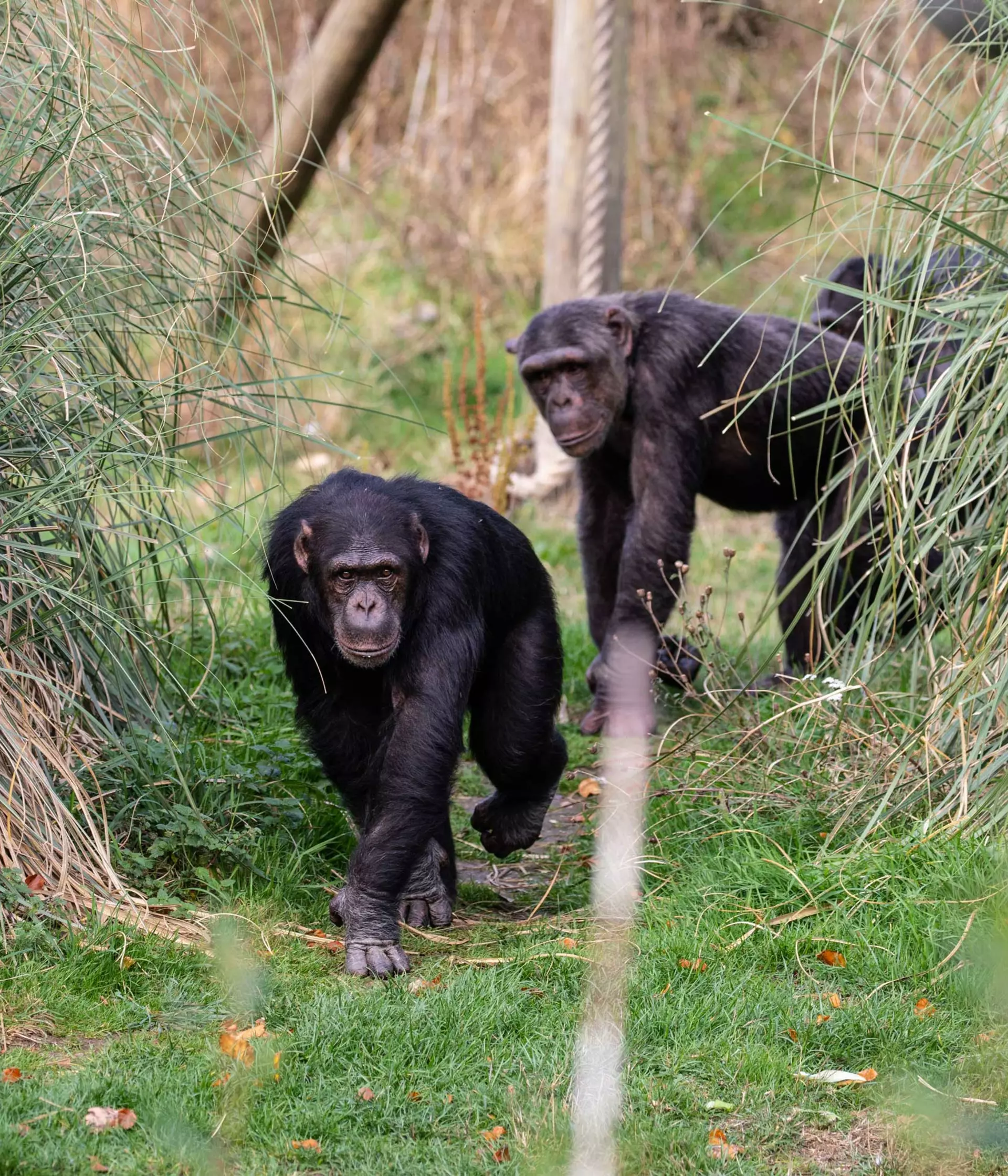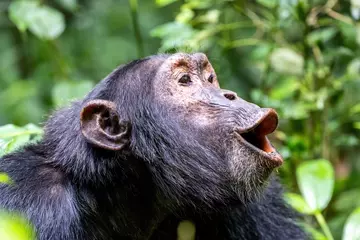
Chimpanzee facts
Ten things you didn't know about chimpanzees
Chimpanzees are more closely related to us than to gorillas
It's well known that chimps are our joint closest relative, along with the bonobo, but we are also one of their closest relatives! They share 98.5% of their DNA with humans, but if you only consider active genes, it's more than 99%.
With chimps, family comes first
Chimps live in what are called fission-fusion societies - small, changeable family groups (typically a mother and her sons) within a larger community of as many as 60 to 130 chimps.
At the Zoo, we have an adult family group of five chimps. Bonnie is the mother of two sons, Phil and Elvis, she is a devoted, protective mum. The group also includes male Grant and 'adopted aunt' Koko.
Chimp communication
Chimps are constantly 'talking' to each other and zookeepers. One study on chimps in Uganda identified 66 gestures they use to convey meaning and 19 specific messages, including flirting (tearing strips from leaves with the teeth) and offering a ride to infants (showing the sole of the foot).
From chest scratching to subtle facial expressions, chimps are constantly communicating - both verbally and non-verbally. Our chimps use threat gestures to put us in our place, throwing up the hand to show the back of the palm. Koko will also blow raspberries at us, meaning "give that to me!".

Chimpanzee tool use
They were the first non-human animals to be observed making and using tools. Archaeologists believe chimps in Africa's Ivory Coast have been using stones as tools to crack open nuts for at least 4,300 years.
Our chimps will use sticks broken down to size to poke at out-of-reach food, pick grass to dry themselves, and use hard surfaces in their enclosure to smash coconuts.
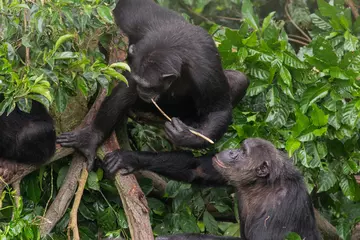
Chimpanzees politics
Chimpanzees may be the most aggressive of the great apes, but ferocity isn't everything. Dominant males will put on displays of strength - screaming, running around, shaking branches. In the wild, that can be a good thing: it's been shown that if very aggressive males do make it to the top spot, they don't tend to keep that ranking very long, perhaps because they lack popular support.
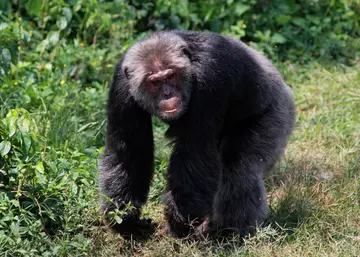
Chimp problem-solving
Chimps love solving problems, a study on our group at the zoo found they would solve a puzzle (pushing red dice through a maze of pipes) without a food reward - suggesting that, like humans, they relished the challenge for its own sake.
We're always thinking up new puzzles for our playful chimps as part of our enrichment programme, which encourages natural behaviour by extending meal times and providing a stimulating mental challenge for these highly intelligent apes. Grant likes to play tug of war with keepers using a stick through the wire mesh!
Chimps are fiercely territorial
They accept other members of their own community, but not chimps from neighbouring groups. Males in the wild often team up to patrol the borders of their territory, and will beat up or even kill any outsiders they encounter.
You may spot the male chimps at Whipsnade (sometimes joined by Bonnie) patrolling their moat in the afternoon. It also takes them a while to get used to new zookeepers. They throw their poo at any new zookeepers at first - and their aim is very good!
Breakfast is one of their favourite meals
Chimps get up at sunrise and start the day by feeding intensively. In the wild, they spend 43-55% of the day foraging.
Whipsnade's chimps are fed at least six times a day, and food is often scattered, hidden or placed in puzzle feeders to encourage natural foraging behaviour. Our chimps get a variety of vegetables, but fruit is a treat, because cultivated fruit in the UK is higher in sugar than wild varieties.
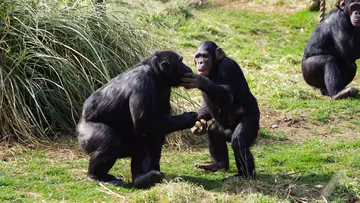
Chimpanzees like to chill
Some people are surprised to see our chimps relaxing so much, but it's natural for them to spend 25-39% of the day resting.
Socialising is also important. Grooming helps reinforce social bonds and hierarchies; expect to see high-ranking chimps receiving the most attention.
At sunset, they turn in for the night. Wild chimps construct nests in trees, weaving the branches together, or sometimes at ground level. We'll leave straw or wood wool out for ours to create cosy nests on their platforms - though Koko prefers to sleep on the ground.
A chimp's memory is better than a human's
In short-term recall tests, they have outperformed people - and they have amazing long-term memories too.
Chimps know all the individuals in their community by sight and by their unique calls. They're also great at mentally mapping their territory - including the precise locations and fruiting periods of thousands of trees.
What do chimps eat?
In the wild chimps mainly eat fruit, but also leaves, buds, blossoms, bark, termites and occasionally other mammals.
We feed our chimps around 6.5kg of fruit and vegetables a day. Each chimp is also given 350g of pelleted food which is made up of protein, fat and fibre, and meat is offered every alternate day. Dates, sunflower seeds, sultanas and nuts are also scattered in the grass to encourage foraging behaviour. Vitamins and minerals are given in drinks, like a herbal tea!
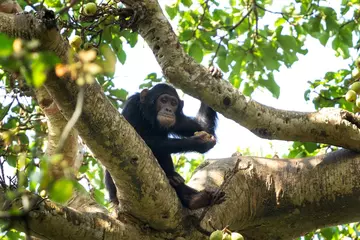
How long do chimps live?
In the wild chimpanzees generally live for 40-45 years, but they can make it as old as 60. Some chimps in the zoos can even make it into their 70s, but this is rare. Our oldest chimp Koko is almost 50!
Chimp size
Males are approximately 1.7m high and females 1.3m. Both weigh 45-80kg.
Chimp threats
Chimpanzees are Endangered due to poaching, habitat loss and disease. With palm-oil production driving deforestation in their native West and central Africa, ZSL is working with oil producers to instil more wildlife-friendly practices, as well as strengthening wildlife monitoring and protection on the ground in key chimp habitat in Cameroon at the Dja conservation complex.
Chimp veterinary care
Our zookeepers and vets work with our chimps to carry out health checks and provide medicine. Our chimps are taught to voluntarily present their hands or shoulders through the bars for injection making treatment much stress free for the chimps.
